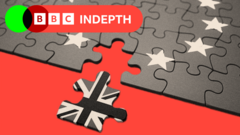**The newly agreed UK-EU framework addresses diverse issues from food trade to fishing rights, revealing potential benefits and drawbacks for various stakeholders.**
**New UK-EU Agreement: Winners and Losers in a Post-Brexit Landscape**

**New UK-EU Agreement: Winners and Losers in a Post-Brexit Landscape**
**A comprehensive look at the implications of the recent UK-EU deal post-Brexit, highlighting beneficiaries and those left behind.**
The United Kingdom and the European Union have forged a pivotal agreement aimed at "resetting" their post-Brexit relationship, with significant ramifications across various domains. Following the summit in London, the deal spans defence, fisheries, food trade, and youth mobility. BBC Verify has dissected the agreement to identify potential winners and losers.
**Food Trade Winners and Losers**
**Winners**: UK food exporters to the EU; **Losers**: Sceptics of EU rules
The new deal proposes a joint food safety agreement intended to minimize checks and bureaucracy surrounding food exports. Currently, UK food exports to the EU have plummeted, largely due to additional constraints introduced post-Brexit, leading to a 34% reduction in import volumes compared to pre-Brexit levels. If fully realized, this agreement could enhance trade significantly, projected at £14 billion for the food sector. However, the price may be dynamic alignment to EU standards and jurisdiction of the European Court of Justice in disputes, frustrating those opposed to EU influence.
**Fishing Rights: Navigating New Waters**
**Winners**: EU fishing fleets; **Losers**: UK fishing industry
The agreement extends EU access to UK waters by 12 years, allowing foreign vessels to fish in return for a share of their quotas. This has drawn ire from UK fishermen, particularly those seeking yearly negotiations, who argue that the deal undermines their bargaining power and could lead to further compromises in the future. Critics view the extension as detrimental, with Scottish Fishermen’s Federation CEO labeling it as a "horror show."
**Youth Mobility: Opportunities and Concerns**
**Winners**: Young people seeking mobility; **Losers**: Immigration control advocates
The proposed "youth experience scheme" is expected to facilitate greater work and study opportunities for young UK and EU citizens, enhancing cultural exchange. However, immigration critics raise concerns that such schemes may inadvertently inflate net migration figures, prompting uncertainty about their long-term impact on UK immigration policy.
**Traveling Easier: Passports and eGates**
**Winners**: UK tourists; **Losers**: Those anticipating shorter queues
The deal opens pathways for British tourists to utilize eGates at select EU airports, which could streamline border crossings. While this stands to improve travel efficiency, implementation details remain murky, leaving travelers unsure of when these changes will come into effect.
**Defence Contracts: A Competitive Advantage**
**Winners**: UK defence companies; **Losers**: EU defence firms hopeful for contracts
The creation of a Security Action for Europe (SAFE) Fund may present lucrative opportunities for UK defence manufacturers to secure contracts traditionally reserved for EU firms. This could shift regional dynamics, granting the UK further economic leverage in global military exports.
The holistic impact of this UK-EU agreement remains to be seen, with numerous stakeholders poised to either benefit from or bear the brunt of its outcomes. As detailed provisions are further delineated, the path to future relations will continue to unfold amidst ongoing debates around sovereignty and collaboration.



















